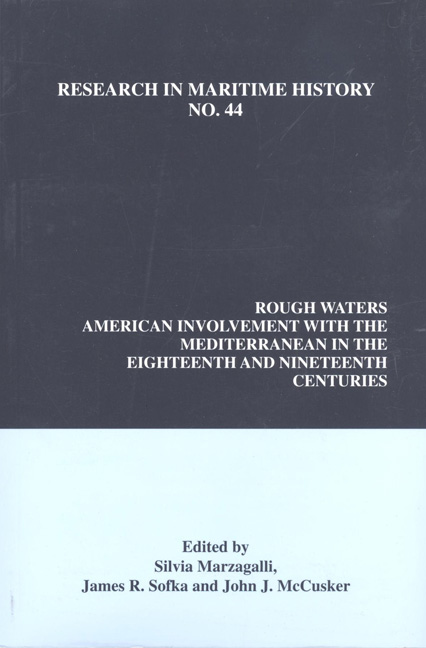Book contents
- Frontmatter
- Contents
- About the Editors
- Contributors' Notes
- “Rough Waters: American Involvement in the Mediterranean in the Eighteenth and Nineteenth Centuries: An Introduction”
- “Worth a War? The Importance of the Trade between British America and the Mediterranean”
- “Relations between North America and the Italian Peninsula, 1763-1799: Tuscany, Genoa and Naples”
- “American Shipping into the Mediterranean during the French Wars: A First Approach”
- “Notes toward a Franco-American Mediterranean 'From Below'”
- “Consuls and Consiglieri: United States Relations with the Italian States, 1790-1815”
- “Old and New Republics: Diplomatic Relations between the Republic of Genoa and the United States of America”
- ‘“From the Halls of Montesuma, to the Shores of Tripoli:’ Antoine Zuchet and the First Barbary War, 1801-1805”
- “Minorca: The First United States Naval Base in the Mediterranean and the American Consulate at Port Mahon”
- “‘The Jeffersonian Idea of National Security’ Revisited”
- “The Reluctant Warrior: Thomas Jefferson and the Tripolitan War, 1801-1805”
- “Slavery as Social Mobility? Western Slaves in Late Eighteenth Century Algiers”
- “Americans in the Mediterranean in the Late Eighteenth and Early Nineteenth Centuries: Concluding Remarks”
“The Reluctant Warrior: Thomas Jefferson and the Tripolitan War, 1801-1805”
- Frontmatter
- Contents
- About the Editors
- Contributors' Notes
- “Rough Waters: American Involvement in the Mediterranean in the Eighteenth and Nineteenth Centuries: An Introduction”
- “Worth a War? The Importance of the Trade between British America and the Mediterranean”
- “Relations between North America and the Italian Peninsula, 1763-1799: Tuscany, Genoa and Naples”
- “American Shipping into the Mediterranean during the French Wars: A First Approach”
- “Notes toward a Franco-American Mediterranean 'From Below'”
- “Consuls and Consiglieri: United States Relations with the Italian States, 1790-1815”
- “Old and New Republics: Diplomatic Relations between the Republic of Genoa and the United States of America”
- ‘“From the Halls of Montesuma, to the Shores of Tripoli:’ Antoine Zuchet and the First Barbary War, 1801-1805”
- “Minorca: The First United States Naval Base in the Mediterranean and the American Consulate at Port Mahon”
- “‘The Jeffersonian Idea of National Security’ Revisited”
- “The Reluctant Warrior: Thomas Jefferson and the Tripolitan War, 1801-1805”
- “Slavery as Social Mobility? Western Slaves in Late Eighteenth Century Algiers”
- “Americans in the Mediterranean in the Late Eighteenth and Early Nineteenth Centuries: Concluding Remarks”
Summary
While serving as a diplomatic envoy in Europe in the 1780s, Thomas Jefferson argued repeatedly, forcefully, but ultimately finitely for a military response to the predatory behaviour of the Barbary rulers of North Africa. Jefferson believed a naval campaign waged either unilaterally or in conjunction with other nations would break the pattern of submission and tribute to the privateering states that prevailed among the lesser European powers. As president almost two decades later, Jefferson faced a renewed threat to American trading interests when Tripoli declared war on the United States in 1801. He promptly dispatched a naval squadron to the Mediterranean, initiating the first phase of a naval conflict with Tripoli that would continue until 1805.
In choosing resistance rather than submission, Jefferson at last appeared to be fulfilling his long-cherished plan to use force to bring the North African regencies to heel. Indeed, many historians have characterized his decision to commit American warships to the Mediterranean in roughly these terms. Yet for all of the apparent continuity between his attitude in the 1780s and his later actions as president, Jefferson's handling of the Barbary crisis diverged in two important respects from the position he had taken previously. First, the goals of his Barbary policy from 1801 to 1805 were much more limited than they had been a decade or more earlier. In the 1780s and early 1790s, Jefferson had wanted to overturn the tribute system by which governments secured the safety of their shipping through payments of cash and gifts to the Barbary rulers. During his presidency, however, his main objective was to convince the pasha of Tripoli and other Barbary leaders to honour their existing treaty arrangements with the United States and accept whatever sums of money and other valuables the American government had agreed to provide. Second, by 1801 Jefferson had also lost something of his former enthusiasm for seeking a naval solution to the Barbary problem. Jefferson still found the idea of paying tribute to be distastefiil, and he was as anxious as ever to assert American honour. But his martial ardour was tempered by his ambivalence about the costs of fighting the Barbary corsairs. Determined not to let the conflict interfere with his domestic program of fiscal retrenchment, Jefferson instead tried to wage war on the cheap.
- Type
- Chapter
- Information
- Rough WatersAmerican Involvement with the Mediterranean in the Eighteenth and Nineteenth Centuries, pp. 185 - 206Publisher: Liverpool University PressPrint publication year: 2010

